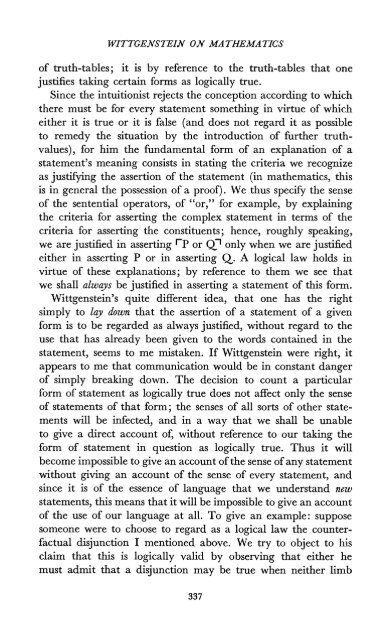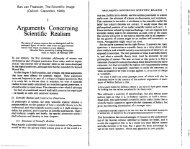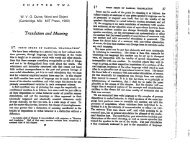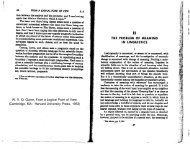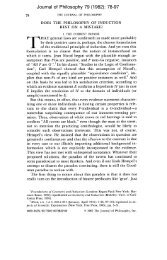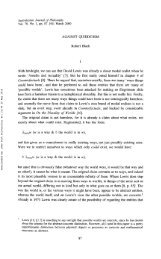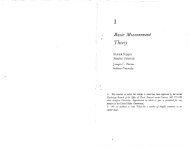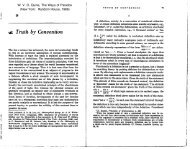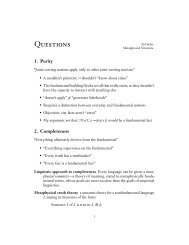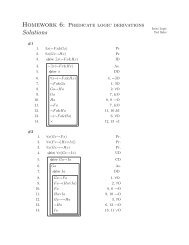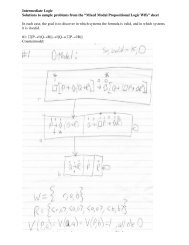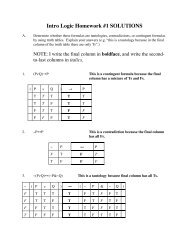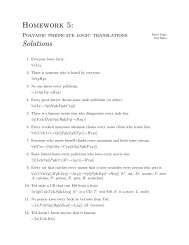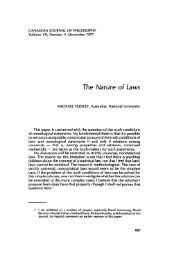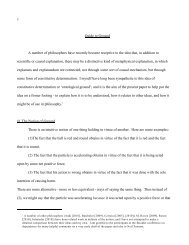Dummett - Wittgenstein's Philosophy of Mathematics.pdf - Ted Sider
Dummett - Wittgenstein's Philosophy of Mathematics.pdf - Ted Sider
Dummett - Wittgenstein's Philosophy of Mathematics.pdf - Ted Sider
You also want an ePaper? Increase the reach of your titles
YUMPU automatically turns print PDFs into web optimized ePapers that Google loves.
WITTGENSTEIN ON MA THEMA TICS<br />
<strong>of</strong> truth-tables; it is by reference to the truth-tables that one<br />
justifies taking certain forms as logically true.<br />
Since the intuitionist rejects the conception according to which<br />
there must be for every statement something in virtue <strong>of</strong> which<br />
either it is true or it is false (and does not regard it as possible<br />
to remedy the situation by the introduction <strong>of</strong> further truth-<br />
values), for him the fundamental form <strong>of</strong> an explanation <strong>of</strong> a<br />
statement's meaning consists in stating the criteria we recognize<br />
as justifying the assertion <strong>of</strong> the statement (in mathematics, this<br />
is in general the possession <strong>of</strong> a pro<strong>of</strong>). We thus specify the sense<br />
<strong>of</strong> the sentential operators, <strong>of</strong> "or," for example, by explaining<br />
the criteria for asserting the complex statement in terms <strong>of</strong> the<br />
criteria for asserting the constituents; hence, roughly speaking,<br />
we are justified in asserting rFP or Q7 only when we are justified<br />
either in asserting P or in asserting Q. A logical law holds in<br />
virtue <strong>of</strong> these explanations; by reference to them we see that<br />
we shall always be justified in asserting a statement <strong>of</strong> this form.<br />
<strong>Wittgenstein's</strong> quite different idea, that one has the right<br />
simply to lay down that the assertion <strong>of</strong> a statement <strong>of</strong> a given<br />
form is to be regarded as always justified, without regard to the<br />
use that has already been given to the words contained in the<br />
statement, seems to me mistaken. If Wittgenstein were right, it<br />
appears to me that communication would be in constant danger<br />
<strong>of</strong> simply breaking down. The decision to count a particular<br />
form <strong>of</strong> statement as logically true does not affect only the sense<br />
<strong>of</strong> statements <strong>of</strong> that form; the senses <strong>of</strong> all sorts <strong>of</strong> other state-<br />
ments will be infected, and in a way that we shall be unable<br />
to give a direct account <strong>of</strong>, without reference to our taking the<br />
form <strong>of</strong> statement in question as logically true. Thus it will<br />
become impossible to give an account <strong>of</strong> the sense <strong>of</strong> any statement<br />
without giving an account <strong>of</strong> the sense <strong>of</strong> every statement, and<br />
since it is <strong>of</strong> the essence <strong>of</strong> language that we understand new<br />
statements, this means that it will be impossible to give an account<br />
<strong>of</strong> the use <strong>of</strong> our language at all. To give an example: suppose<br />
someone were to choose to regard as a logical law the counter-<br />
factual disjunction I mentioned above. We try to object to his<br />
claim that this is logically valid by observing that either he<br />
must admit that a disjunction may be true when neither limb<br />
337


